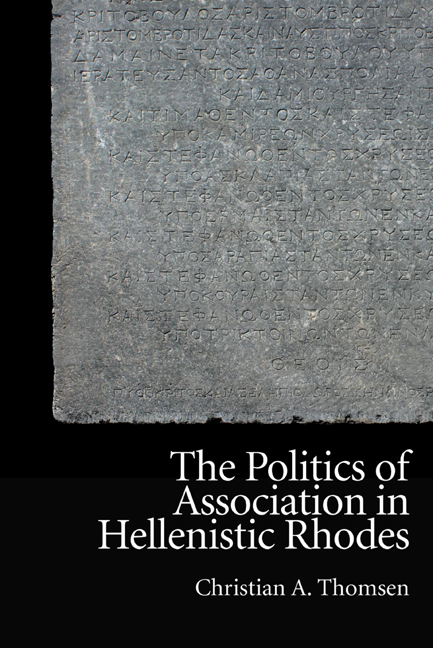Book contents
- Frontmatter
- Contents
- List of Tables and Figures
- Acknowledgements
- Abbreviations of Epigraphic Corpora
- Maps
- 1 Introduction
- 2 Rhodian Democracy
- 3 The Oikos
- 4 Public Associations
- 5 Private Associations
- 6 Private Associations and Human Resources
- 7 The Civic Aspirations of Private Associations
- 8 The Corporate Polis
- Bibliography
- Index Locorum
- General Index
8 - The Corporate Polis
Published online by Cambridge University Press: 08 October 2020
- Frontmatter
- Contents
- List of Tables and Figures
- Acknowledgements
- Abbreviations of Epigraphic Corpora
- Maps
- 1 Introduction
- 2 Rhodian Democracy
- 3 The Oikos
- 4 Public Associations
- 5 Private Associations
- 6 Private Associations and Human Resources
- 7 The Civic Aspirations of Private Associations
- 8 The Corporate Polis
- Bibliography
- Index Locorum
- General Index
Summary
We began this study by noting the existence of two different poleis within the ancient Greek city-state. One was the state, an exclusive community of the citizens; the other was the city, or the social sphere, a ‘corporate polis’ made up of various corporate groups, recalling Aristotle's association of associations. At the centre of both poleis stood a small group of wealthy families who became benefactors and, through benefactions, also the leading members of those associations, both public and private, to which they belonged. The central contention of this study has been that the relationships formed within and between individuals, families and associations greatly influenced – in fact, shaped – the course of politics in Hellenistic Rhodes, and our findings may be briefly summarised.
The first concern the families themselves. Family ties meant access to two important resources: wealth and experience. Despite the scanty nature of the sources, we nevertheless have ample evidence of father–son cooperation in politics, with that of Theaidetos and Astymedes being the most famous. Through marriage and adoption, members of the elite formed alliances between families which could offer either experience or wealth, or both. Wealth and experience were key resources without which entry into the ranks of the magisterial elite was seriously hampered. Those who were without distinguished pedigree and therefore without the patronage of experienced members of the magisterial elite resorted to marriage and adoption in order to secure access to the family networks through which these resources flowed.
The same individuals who occupied high office on the federal level also took a keen interest in the public subdivisions to which they belonged. The three old poleis still retained a measure of independence and competed against each other at the federal level. In both Lindos and Kamiros, demesmen sought to expand and maintain the reputation and status of their demes through benefactions to the state. In this eff ort they were aided by the elite, who often gave their money on behalf of their demes. In return they won the loyalty of their demesmen, who also seem to have taken no small pride in the success of those of their numbers who achieved high office. On the available evidence it is difficult to see what local interests were behind the local patriotism of the demes.
- Type
- Chapter
- Information
- The Politics of Association in Hellenistic Rhodes , pp. 160 - 162Publisher: Edinburgh University PressPrint publication year: 2020



